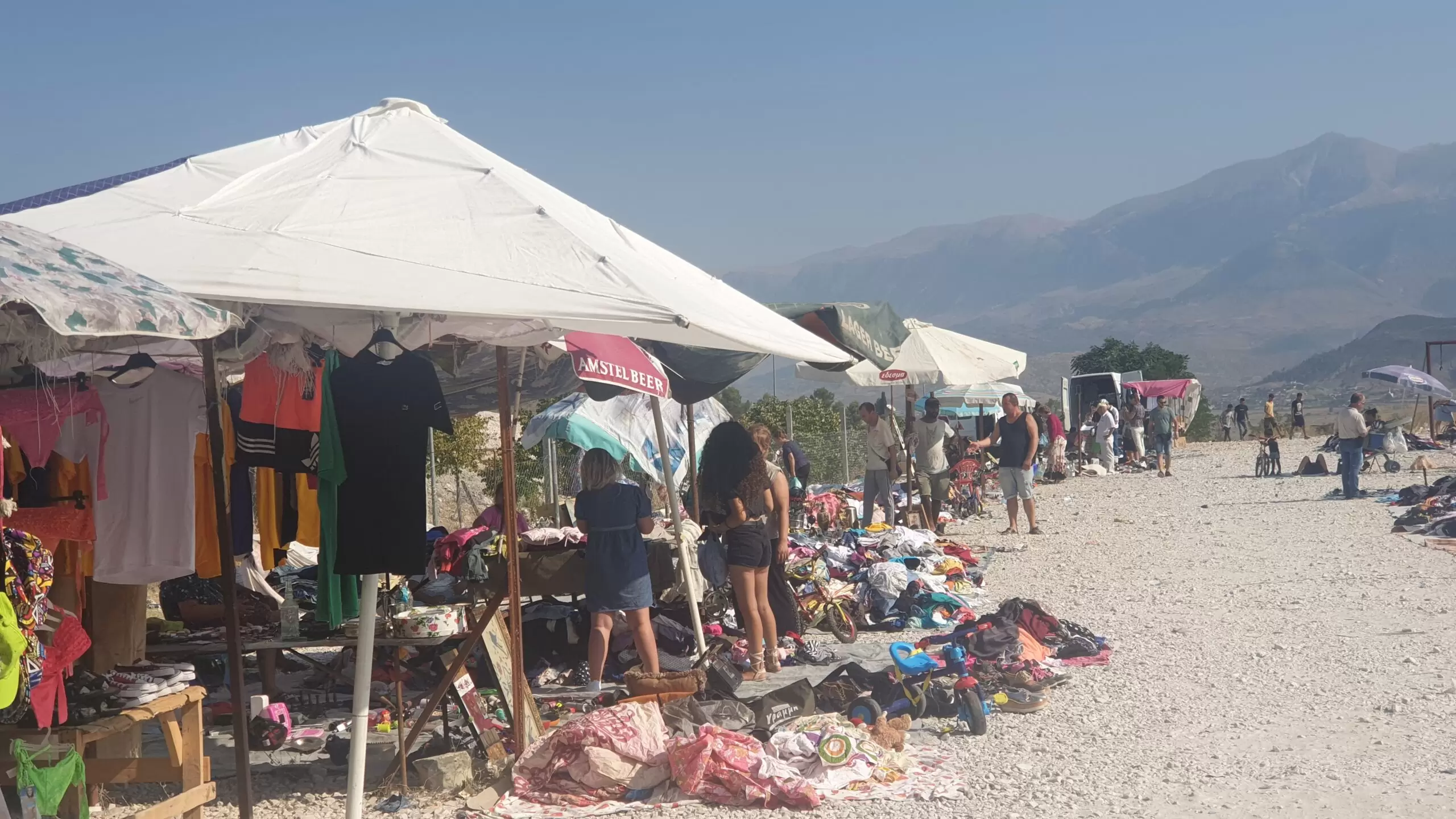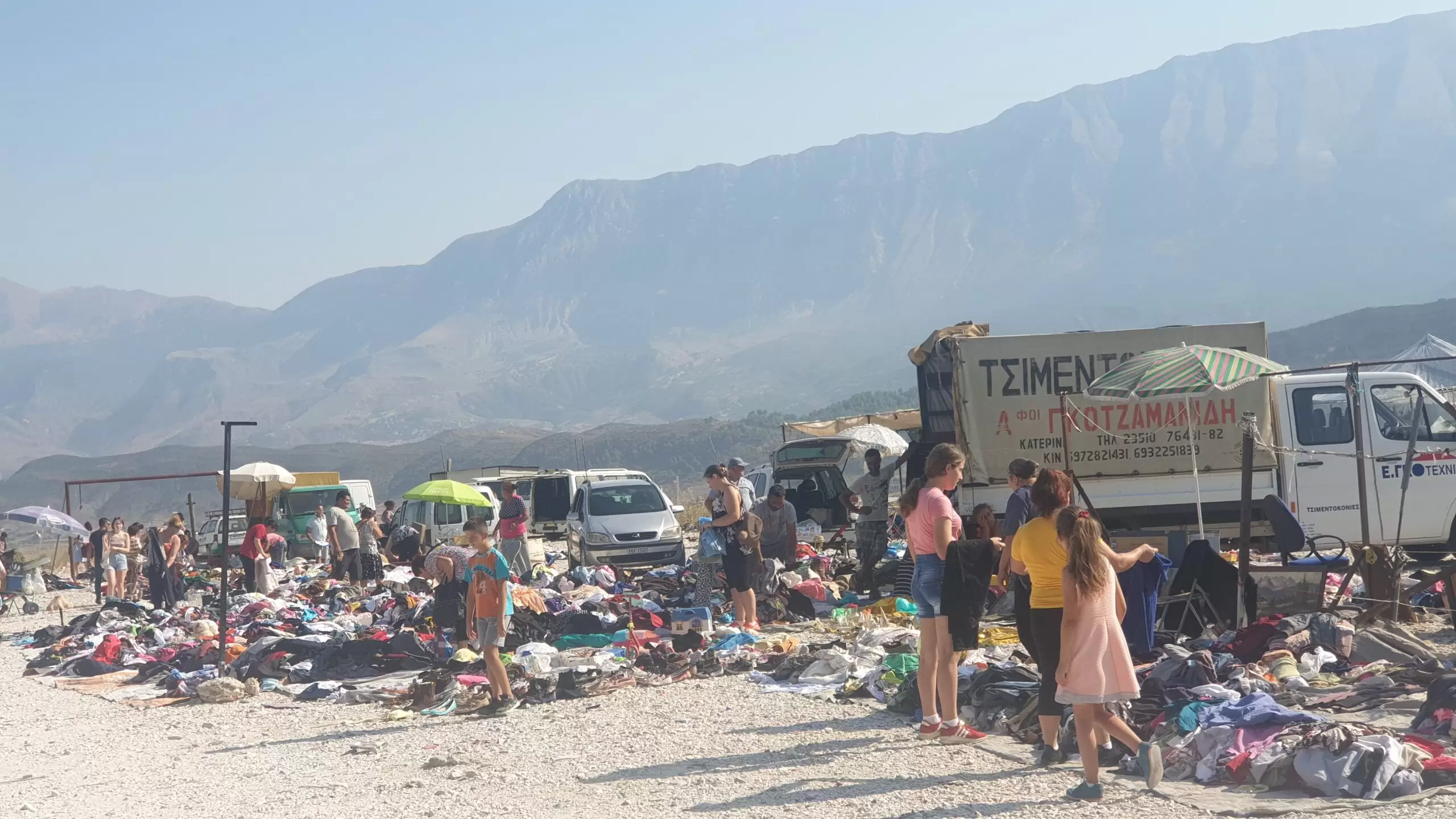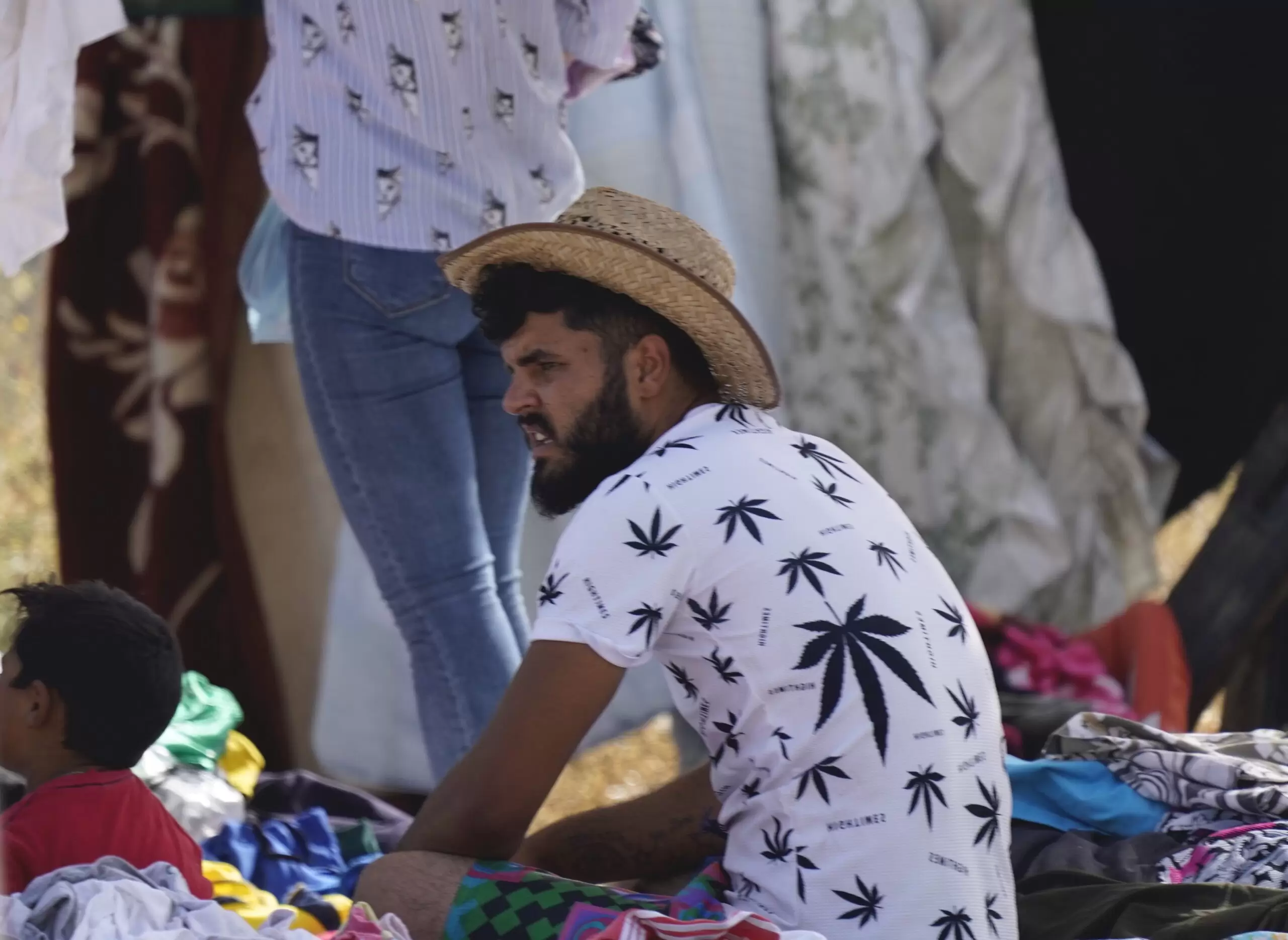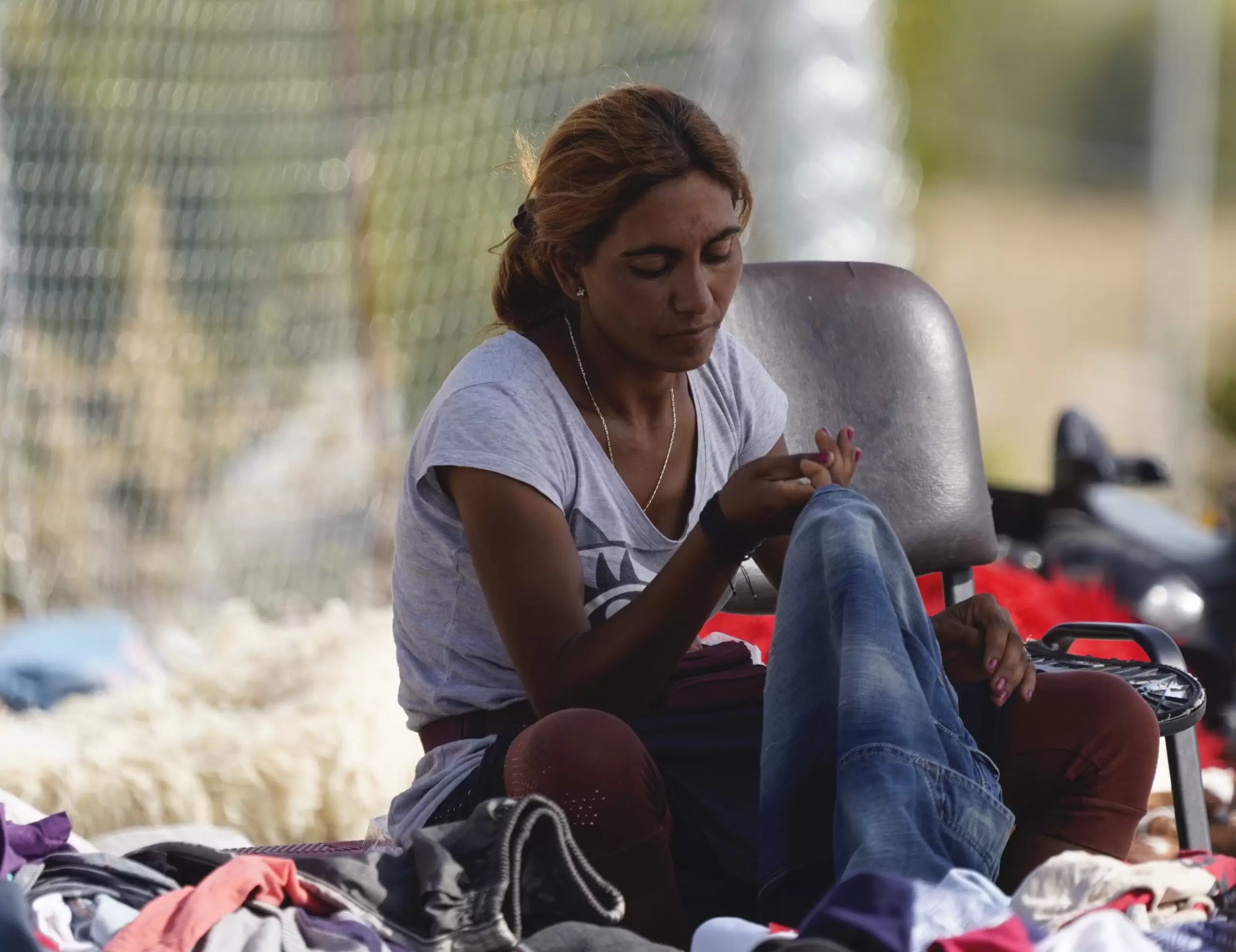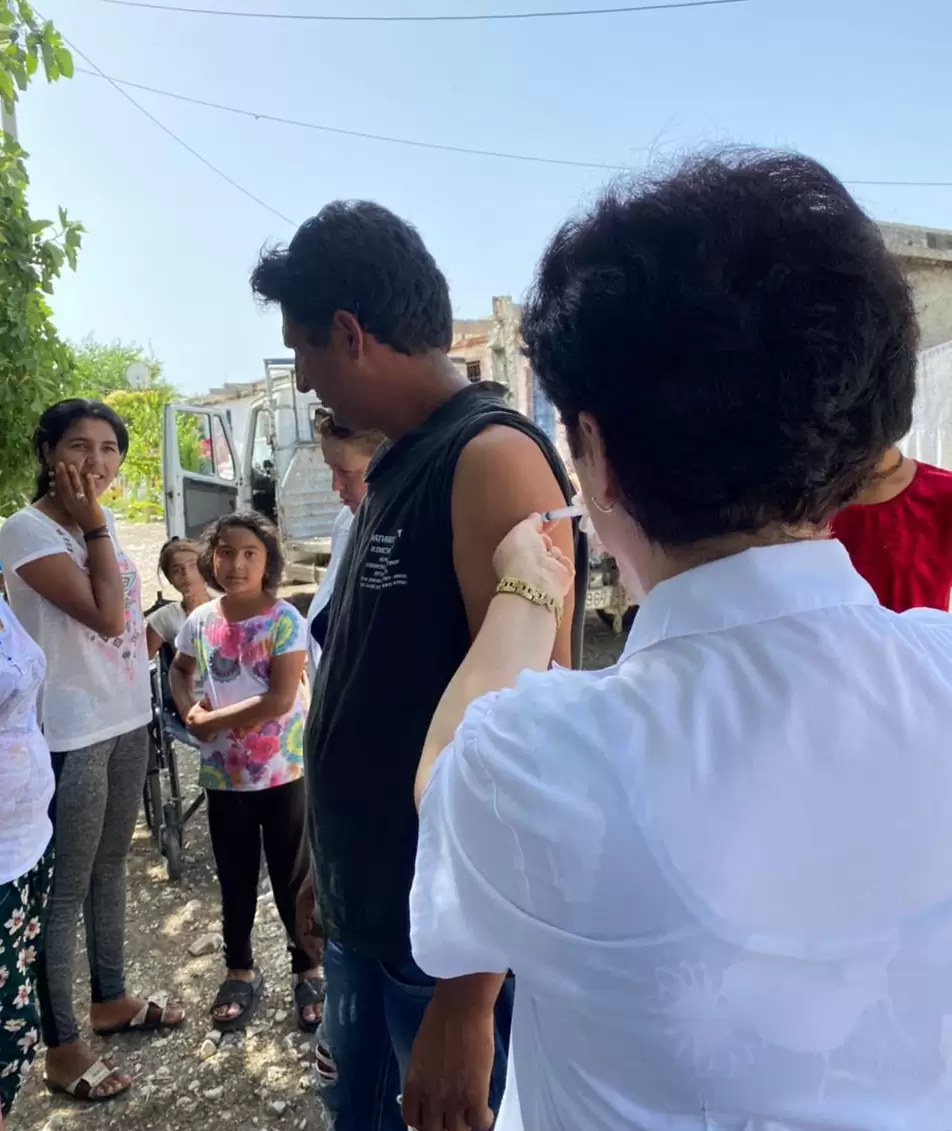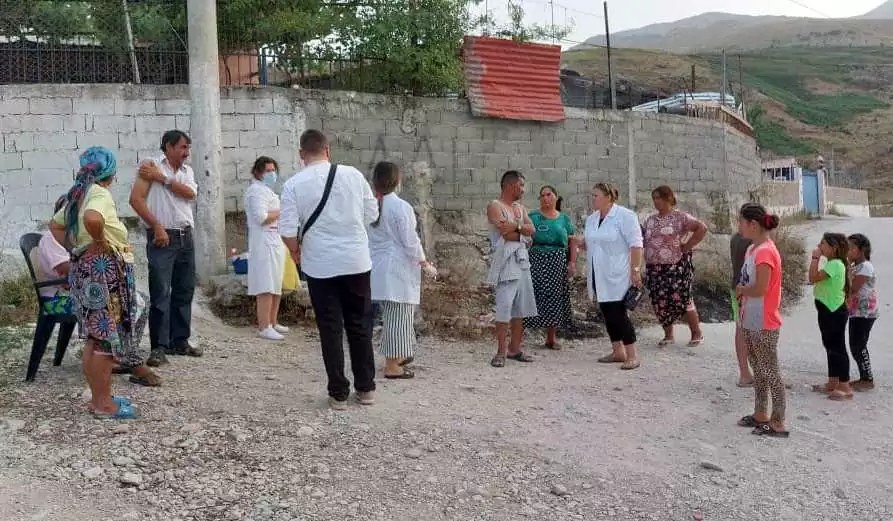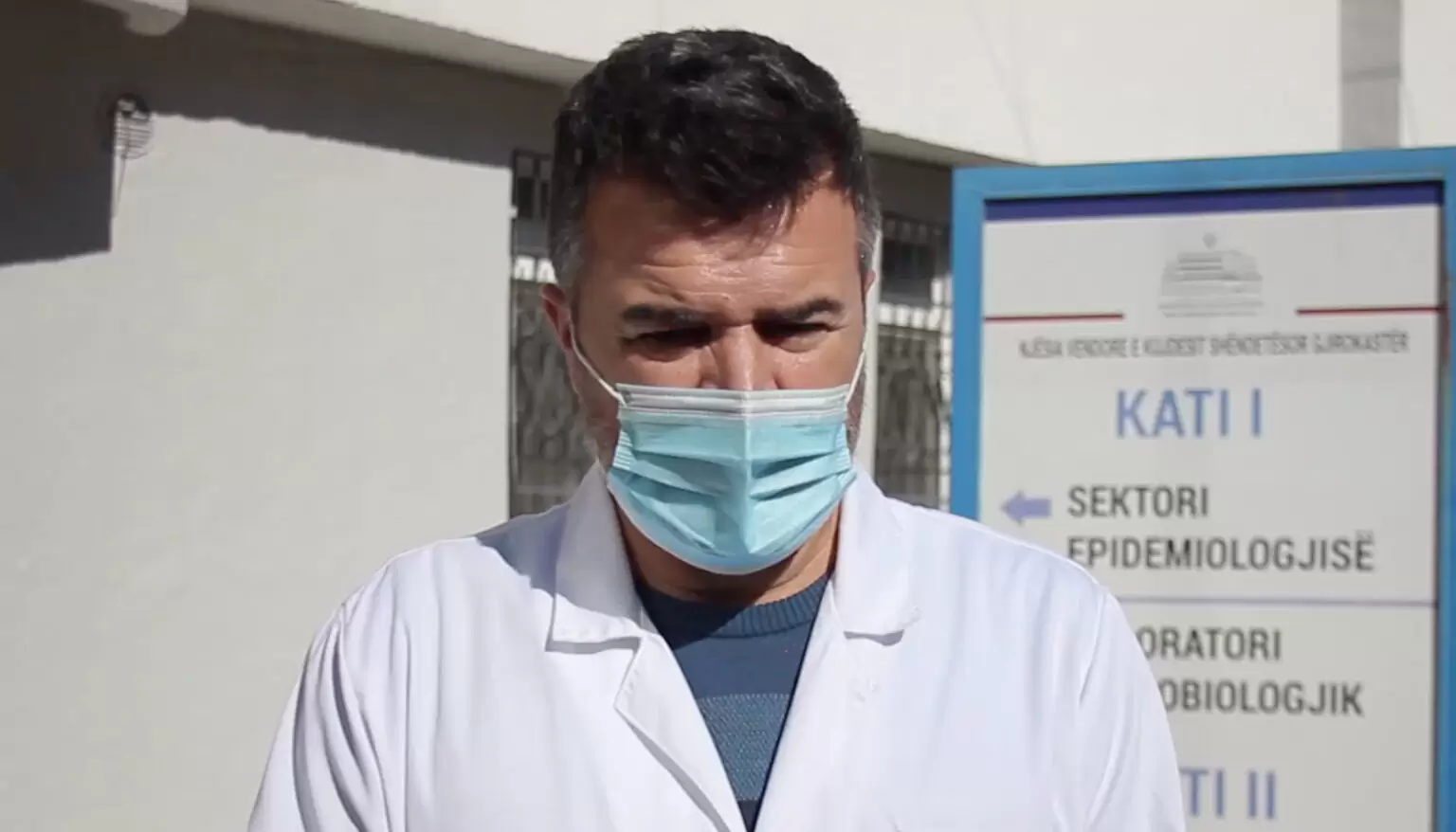RAIMOND KOLA
Fewer than 200 people from 1300 comprising the Roma community living in Zinxhira in Gjirokastra have been vaccinated, although the municipality has already reached a population vaccination rate of 70%. The epidemiological service is concerned about the mass vaccination refusal by this community despite its members regularly traveling to Greece to obtain secondhand clothes to sell in the local market. The number of vaccinated Roma in the neighboring country is significantly small and the health authority fears that the Covid-19 virus and its novel variant will be able to spread as a result.
Despite the high summer temperatures, the secondhand clothing and appliance market in Gjirokastra, also known as the “Roma Market”, is crowded with customers. Secondhand carpets, clothing, furniture, electrical and electronic appliances, and devices are located on a white gravel area of several hundred square meters, visited by numerous buyers throughout the day. Part of the Roma people selling there has returned from Greece only a week ago, where they obtained the goods they sell, while others are residents in the Zinxhira neighborhood in Gjirokastra. Roughly 150 families in that neighborhood comprising 1300 inhabitants sell secondhand clothing and appliances. The market also includes Roma traveling merchants from Korça, who sell their products to buyers or wholesale them to the families that sell in this market.
Roma Market, Gjirokastra
“Now that the border with Greece is open, we have brought in clothes and many people are buying them”, Mario, a boy donning a straw hat, said. He is glad that crossing the border is easier and that he is now able to travel to and from Ioannina to bring in secondhand clothes.
“We buy these there and sell them here. Then, with the money we earn, we buy more. This is what we do and how we make a living”- Mario said. He admits to not having been vaccinated against Covid-19, nor to having been infected with Coronavirus, to his knowledge.
Mario’s mother, who sells nearby, stated that their family composed of 11 members is skeptical about the vaccine’s protection against the virus.
“They want to take our money, so why should we get it?” – she said, while exhibiting a dry cough from time to time and being around seventy years of age. When we inquired about her cough, she said it was due to several years of smoking. Meanwhile, her son, Mario, said that he had to have the Covid test performed whenever he had to travel to Greece to obtain secondhand clothes, as it is a requirement.
“I think I will get vaccinated in Greece” – said he, as it is not feasible to continue paying for the test each time. In Gjirokastra, the COVID-19 PCR test costs ALL 6000, a large amount for Roma families, which, at times, attempt to evade border crossing procedures by having only the rapid test performed on the Greek side of the border.
Roma Market in Gjirokastra
Esma, a woman selling carpets nearby, said that she was vaccinated and had no issues.
“The nurses visited the neighborhood and we got vaccinated. Some are willing to get it, others are not. Everyone thinks differently” – said Esma.
“They refuse to get vaccinated. The epidemiological service workers have come a couple of times, but we did not get the vaccine, as we neglected it” – Toni, the neighbor of the previous sellers, who is not a member of the Roma community, said.
Since 1991, the sale of secondhand clothes has been the main source of revenue for Roma families in Gjirokastra. The market has moved at times and has now settled in the suburbs, in the sparsely inhabited area of Grehot. Several years prior, researchers warned that the revenues from secondhand goods sale were declining and, if sustainable alternatives would not be developed, then the economic well-being of Roma people would be at risk.
However, the rising poverty in the other economic classes in Gjirokastra and beyond, has led to an overcrowding of the Roma Market in the past two-three years with buyers of all ages, particularly the elderly, who are able to purchase necessary commodities at very low prices.
Esma, a Roma merchant
The vaccination of the Roma poses a challenge to Gjirokastra epidemiologists
The epidemiological service in Gjirokastra conducts daily activities to promote vaccination, in addition to its activity in the established vaccination centers. Mr. Arenc Brahimi, Director of the Service, stated that the population has responded positively to the process, including youths and the elderly, who are the most vulnerable.
“More than 27 thousand people have been vaccinated since the process commencement in both the city and in the villages, comprising 70% of the population” – Mr. Brahimi said.
There are difficulties regarding the Roma community as many of its members frequently travel abroad and may potentially spread the virus, as they refuse to be vaccinated.
“More than 170 vaccines have been administered to this community and the campaign continues. The epidemiological service has visited their neighborhood in the city suburbs and part of the Roma people there has been vaccinated. The rest were either working or traveling to Greece. They are quite hesitant, particularly those younger. However, we will continue our efforts” – Mr. Brahimi said.
According to the Epidemiological Service in Gjirokastra, there has been no vaccine side effect case reported during the vaccination process in the Roma families, only part of which have medical records available at the health service. Part of the community that frequently travels to Greece has no medical records available, as they rarely visit the family doctor to receive health care.
Fushata për vaksinimin e romëve
Vaccination of the Roma community in “Zinxhira”, where a large majority of them live.
The epidemiological services confirm that they are also monitoring cases of Roma people who have received both vaccine doses in Greece and hold the respective vaccination card, but the number is small. During this time, no “Delta” variant cases have been identified in the Roma community or in other city areas.
“Detected cases have either been students arriving from abroad or emigrants.” – Mr. Brahimi confirmed.
However, as epidemiologists have discovered, overcrowded tourist weekends in August, particularly in the Historical Center, increase the infection risk in youths, who are more careless about the situation.
Arenc Brahimi/Shefi i Shërbimit të epidemiologjisë Gjirokastër
Romët gjithmonë me sfida komplekse
Komuniteti rom në bashkinë e Gjirokastrës, sipas të dhënave zyrtare llogaritet në 200 familje, ose 900 persona kundrejt 37,610 banorëve që ka në total qyteti i Gjirokastrës. Ai është i përqëndruar në të ashtuquajturën “Lagjja “Zinxhira”. Në këto shifra, sipas studimeve vendore të mbështetura nga donatorët nuk janë përfshirë familjet rome që aktualisht ndodhen jashtë vendit për arsye emigrimi, si dhe familjet që kanë migruar brenda vendit për arsye pune ose janë shpërngulur nga Gjirokastra për të jetuar në një qytet tjetër të Shqipërisë. Gjithashtu nga të dhënat rezultonë se rreth 80 familje të tjera që aktualisht ndodhen në emigrim për arsye të ndryshme ekonomike – sociale, janë të lokalizuar në zonën e Janinës. Përveç romëve që janë të përqendruar pranë lagjes Zinxhira, rreth 50-60 familje të tjera migratore vijnë kryesisht nga Pogradeci, Korça, Elbasani dhe vendosen në periudha të ndryshme pranë Urës së Lumit. Ata jetojnë në çadra të ngritura buzë lumit, në një zonë ku mungon gjithçka. Ky grup merret kryesisht me shitje rrobash të përdoruara dhe mbledhje hekurishtesh.
“Po të krahasojmë infrastrukturën në lagjet brenda për brenda qytetit të Gjirokastrës, furnizimin konstant me ujë të pijshëm, shërbimin e besueshëm të furnizimit me energji elektrike, kushtet e rrugëve, dhe telekomunikacionet, ato janë shumë më të këqija në komunitetin Rom. Si rezultat, shumica e romëve jetojnë në kushte ekstremisht të varfëra, me një infrastrukturë që mungon plotësisht apo me kufizime për t’u aksesuar. Meqë romët tentojnë të vendosen në lagjet periferike, ata shpesh nuk janë të lidhur me shërbimet publike, me rrjetin elektrik, dhe kanë mungesë të alternativave të transportit. Duke jetuar në këto lloj kushtesh, përkrah mungesës së përgjithshme të kujdesit shëndetësor të përballueshëm, në mënyrë tipike, ata jetojnë 10-15 vjet më pak se popullsia jo rome”- thuhet në Strategjinë e Zhvillimit të Qarkut Gjirokastër.

